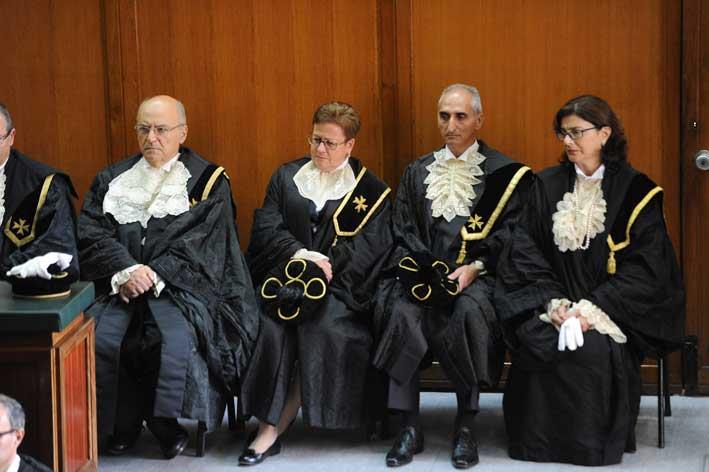Chief Justice Silvio Camilleri said today that amnesties are seen by society as a reward to people who broke the law.
An amnesty means forgiveness for any law breaking activity, he said, adding that those who are respectful of the law feel aggravated as they see those who broke the law effectively being rewarded.
Addressing a ceremony to open the forensic year, Chief Justice Camilleri explained that this is creating a sense of injustice.
This, he said, results in encouraging others to not conform with the law due to possible future amnesties. “Another consequence is that the courts are legitimacy in the eyes of the public, as the administrators of justice, is put into question as the law does not remain equal for everyone”.

He urged serious reflection regarding the consequences of granting amnesties.
The Chief Justice might have been hinting, through the aforementioned part of his speech, at the recent amnesty given to people who broke planning laws by carrying out illegal development.
The Chief Justice also said that the time has come to consider moving the courts to a larger building. “It seems that an increase in the number of members of the judiciary is inevitable, however this cannot occur before there are more court rooms. Right now, structural modifications are occurring to create three more halls, however the time will come where this would no longer be possible”.
“Even today, the halls are claustrophobic, the offices are small, there is only a small amount of space for the public”.

Turning to the Juvenile Court, housed at the Santa Venera Social Work centre, he said that logistical problems exist, and urged that it be moved to a building closer to the main courts in Valletta.
Mr Justice Camilleri also spoke about the Courts being in the public eye, “normally in a bad way”. “The court gives thousands of judgements throughout the year, yet it is that one that, for good reason or not, makes a lot of noise and end up on the front pages. It is good that the Courts are scrutinised, however many a time the courts are targeted by criticism by those who are not well informed by the facts and circumstances surrounding a case”.
Turning to the number of judges and magistrates, he said that the number in Malta is less than the median amount of countries in the EU. He said that the executive over the years has increased the number of judiciary on the islands, “yet it is clear that this is not enough to keep up with the amount of new laws, rights etc being created”.

The Chief Justice also mentioned the recent reforms regarding the Administration of Justice. He said that one could have gone further with the reforms, referring to the appointments of members of the judiciary, however it “seems that political consensus went as far as it could”.
He touched upon mediation as an alternative to legal action. “I believe this has the potential to reduce the delays experienced in court”. Recently a white paper on mediation, practice that seeks to settle disputes outside of court in a less costly and more efficient manner, was launched.
Judiciary candidates must be honest, independent and capable of being impartial – George Hyzler
President of the Chamber of Advocates George Hyzler spoke about recent Constitutional amendments, regarding appointments to the Judiciary. He praised the PN and PL for coming together and finding agreement, however criticised that the law did not go far enough. He said the Chamber of Advocates has long said that the executive must be as distant as possible from such appointments.
“Today, essentially we still have a situation where the choice is one which is political. What changed, essentially, was that the Justice Minister will have the seal of approval from this independent committee, yet he would not be tied to some graduation of candidates, or with some expression of preference by the Committee”.
As reported this morning by The Malta Independent, Dr Hyzler used his speech to address this situation. He said that if government decides to ignore the evaluation by the Committee, they would need to give an explanation in Parliament.

He called this law a step in the right direction, however.
Candidates, he said, must be honest, stable, independent, capable of being impartial, and of good character.
He turned his gaze to the Lawyers Act, which has yet to be implemented.
“We have a situation where government is being spurred by representatives of the legal profession, to pass a law to regulate the very same profession. It is ironic that the request for regularisation is coming from such representatives, when one expects that such a request be made by the people's representatives”.
He said that he suspects there are those who do not want such a law to be introduced.
Turning to efficiency in the courts, Dr Hyzler said that more expenditure on infrastructure, better management of facilities and an improvement in human resources can help, “but so can a commitment by the Judiciary to keep to case times and judgements being given on time”
He said that the experiment of court attorneys seems to have worked, yet he has reservations as to the transparency of how they are appointed and their impartiality. He recommended that the Committee in charge of judicial appointments be extended to include the choice of Court Attorneys.
With regard to Court experts, he also said that a push must be made in order for a list of experts, along with their qualifications, be drawn up, open to scrutiny, “and that Magistrates in particular appoint experts on the basis of ability and capability more than on the basis of trying to help them out”.